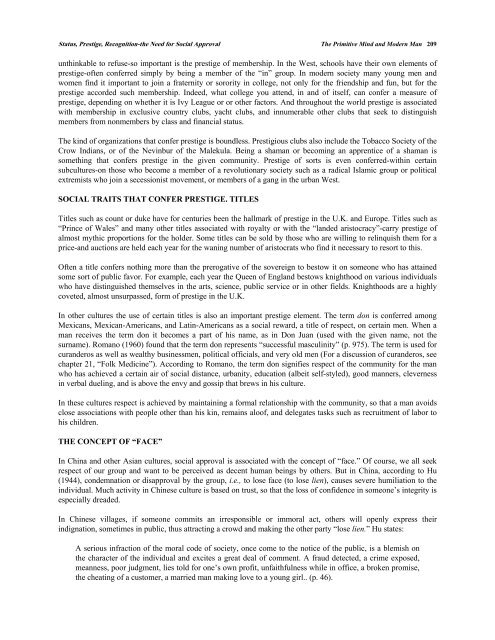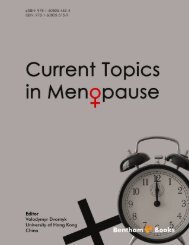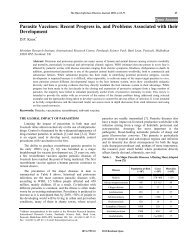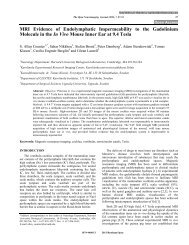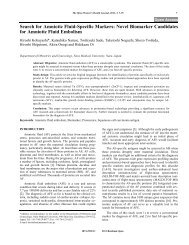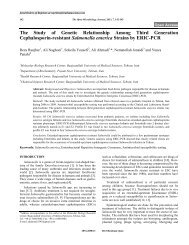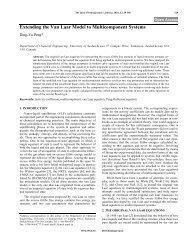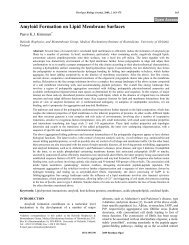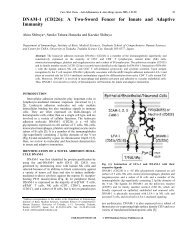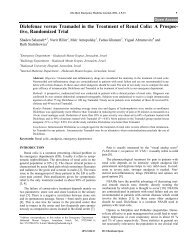chapter 1 - Bentham Science
chapter 1 - Bentham Science
chapter 1 - Bentham Science
You also want an ePaper? Increase the reach of your titles
YUMPU automatically turns print PDFs into web optimized ePapers that Google loves.
Status, Prestige, Recognition-the Need for Social Approval The Primitive Mind and Modern Man 209<br />
unthinkable to refuse-so important is the prestige of membership. In the West, schools have their own elements of<br />
prestige-often conferred simply by being a member of the “in” group. In modern society many young men and<br />
women find it important to join a fraternity or sorority in college, not only for the friendship and fun, but for the<br />
prestige accorded such membership. Indeed, what college you attend, in and of itself, can confer a measure of<br />
prestige, depending on whether it is Ivy League or or other factors. And throughout the world prestige is associated<br />
with membership in exclusive country clubs, yacht clubs, and innumerable other clubs that seek to distinguish<br />
members from nonmembers by class and financial status.<br />
The kind of organizations that confer prestige is boundless. Prestigious clubs also include the Tobacco Society of the<br />
Crow Indians, or of the Nevinbur of the Malekula. Being a shaman or becoming an apprentice of a shaman is<br />
something that confers prestige in the given community. Prestige of sorts is even conferred-within certain<br />
subcultures-on those who become a member of a revolutionary society such as a radical Islamic group or political<br />
extremists who join a secessionist movement, or members of a gang in the urban West.<br />
SOCIAL TRAITS THAT CONFER PRESTIGE. TITLES<br />
Titles such as count or duke have for centuries been the hallmark of prestige in the U.K. and Europe. Titles such as<br />
“Prince of Wales” and many other titles associated with royalty or with the “landed aristocracy”-carry prestige of<br />
almost mythic proportions for the holder. Some titles can be sold by those who are willing to relinquish them for a<br />
price-and auctions are held each year for the waning number of aristocrats who find it necessary to resort to this.<br />
Often a title confers nothing more than the prerogative of the sovereign to bestow it on someone who has attained<br />
some sort of public favor. For example, each year the Queen of England bestows knighthood on various individuals<br />
who have distinguished themselves in the arts, science, public service or in other fields. Knighthoods are a highly<br />
coveted, almost unsurpassed, form of prestige in the U.K.<br />
In other cultures the use of certain titles is also an important prestige element. The term don is conferred among<br />
Mexicans, Mexican-Americans, and Latin-Americans as a social reward, a title of respect, on certain men. When a<br />
man receives the term don it becomes a part of his name, as in Don Juan (used with the given name, not the<br />
surname). Romano (1960) found that the term don represents “successful masculinity” (p. 975). The term is used for<br />
curanderos as well as wealthy businessmen, political officials, and very old men (For a discussion of curanderos, see<br />
<strong>chapter</strong> 21, “Folk Medicine”). According to Romano, the term don signifies respect of the community for the man<br />
who has achieved a certain air of social distance, urbanity, education (albeit self-styled), good manners, cleverness<br />
in verbal dueling, and is above the envy and gossip that brews in his culture.<br />
In these cultures respect is achieved by maintaining a formal relationship with the community, so that a man avoids<br />
close associations with people other than his kin, remains aloof, and delegates tasks such as recruitment of labor to<br />
his children.<br />
THE CONCEPT OF “FACE”<br />
In China and other Asian cultures, social approval is associated with the concept of “face.” Of course, we all seek<br />
respect of our group and want to be perceived as decent human beings by others. But in China, according to Hu<br />
(1944), condemnation or disapproval by the group, i.e., to lose face (to lose lien), causes severe humiliation to the<br />
individual. Much activity in Chinese culture is based on trust, so that the loss of confidence in someone’s integrity is<br />
especially dreaded.<br />
In Chinese villages, if someone commits an irresponsible or immoral act, others will openly express their<br />
indignation, sometimes in public, thus attracting a crowd and making the other party “lose lien.” Hu states:<br />
A serious infraction of the moral code of society, once come to the notice of the public, is a blemish on<br />
the character of the individual and excites a great deal of comment. A fraud detected, a crime exposed,<br />
meanness, poor judgment, lies told for one’s own profit, unfaithfulness while in office, a broken promise,<br />
the cheating of a customer, a married man making love to a young girl.. (p. 46).


